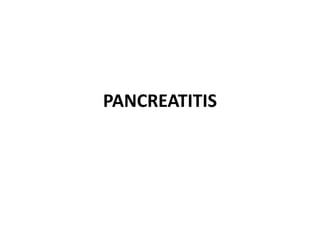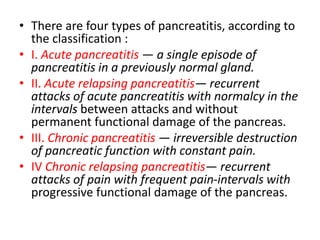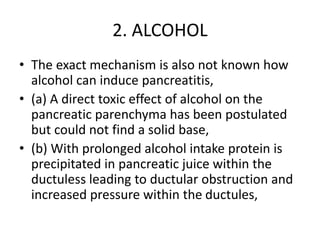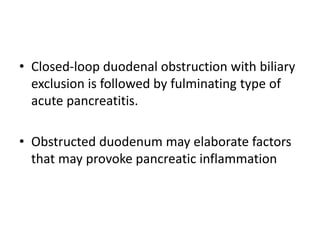PANCREATITIS.pptx
- 1. PANCREATITIS
- 2. âĒ Pancreatitis is inflammation of the pancreas. âĒ The pancreas is a large gland behind the stomach, close to the first part of the small intestine, called the duodenum. âĒ The pancreas has two main functionsâto make insulin and to make digestive juices, or enzymes, to help you digest food. âĒ These enzymes digest food in the intestine. âĒ Pancreatitis occurs when the enzymes damage the pancreas, which causes inflammation.
- 3. âĒ There are four types of pancreatitis, according to the classification : âĒ I. Acute pancreatitis â a single episode of pancreatitis in a previously normal gland. âĒ II. Acute relapsing pancreatitisâ recurrent attacks of acute pancreatitis with normalcy in the intervals between attacks and without permanent functional damage of the pancreas. âĒ III. Chronic pancreatitis â irreversible destruction of pancreatic function with constant pain. âĒ IV Chronic relapsing pancreatitisâ recurrent attacks of pain with frequent pain-intervals with progressive functional damage of the pancreas.
- 4. ACUTE AND ACUTE RELAPSING PANCREATITIS 'Acute pancreatitisâ means acute inflammation superimposed on a normal gland and when such several episodes occur âacute relapsing pancreatitisâ is said to exist.
- 5. Pathogenesis 1 GALLSTONES AND CHOLEDOCHOLITHIASIS: Gallstones and alcohol are the two major conditions which can give aetiological explanation of no less than nearly 90% of cases of acute pancreatitis.
- 6. âĒ The mechanism by which gallstones result pancreatitis is not very clearly known, âĒ (a) For quite a long time common channel theory â has given much importance in which bile reflux into the pancreatic duct as the two ducts join together to form the common channel before they open into the duodenum. âĒ But unfortunately bidirectional reflux i.e bile flowing into the pancreatic duct and pancreatic juice into the bile duct has been observed in humans without pancreatitis.
- 7. âĒ Active perfusion of normal bile into pancreatic duct at normal pressure does not cause pancreatitis. âĒ Moreover pressure in the pancreatic duct system is consistently higher than that in the bile duct system and that is why one cannot expect that bile will perfuse the pancreatic ducts.
- 8. âĒ (b) Transient obstruction of the pancreatic duct by gallstones can result in pancreatitis. âĒ Transampullary migration of biliary calculi appears to be well established as an important cause of acute and acute relapsing pancreatitis. âĒ Several studies have indicated tha choledocholithiasis can lead to the development of acute pancreatitis even in the absence of a common biliary-pancreatic channel. âĒ Presumably the presence of an ampullary stone or oedema at the papilla can obstruct pancreatic duct outflow and thus results increase in pressure within the pancreatic duct system.
- 9. 2. ALCOHOL âĒ The exact mechanism is also not known how alcohol can induce pancreatitis, âĒ (a) A direct toxic effect of alcohol on the pancreatic parenchyma has been postulated but could not find a solid base, âĒ (b) With prolonged alcohol intake protein is precipitated in pancreatic juice within the ductuless leading to ductular obstruction and increased pressure within the ductules,
- 10. âĒ (c) Duodenal inflammation induced by alcohol may produce some degree of duct obstruction, âĒ (d) Persistent vomiting may cause regurgitation of duodenal contents into the pancreatic ducts âĒ Two mechanisms seen to give reasonable explanation how alcohol may cause acute pancreatitis.
- 11. âĒ (e) alcohol stimulates pancreatic secretion by way of acid-induced secretion release, âĒ (f) Alcohol increases sphincteric tone at the ampullary region. âĒ So alcohol increases secretion against an unyielding sphincter. âĒ This seems to be the most reasonable explanation of how alcohol causes acute pancreatitis.
- 12. 3. OBSTRUCTION âĒ It is obvious that some sort of obstruction of the pancreatic duct is required to produce acute pancreatitis. âĒ But deliberate ligation of the major pancreatic duct in the treatment of chronic relapsing pancreatitis has not caused acute disease âĒ So duct obstruction must be associated with stimulation of pancreatic secretion.
- 13. âĒ Closed-loop duodenal obstruction with biliary exclusion is followed by fulminating type of acute pancreatitis. âĒ Obstructed duodenum may elaborate factors that may provoke pancreatic inflammation
- 14. 4. METABOLIC FACTORS. âĒ (a) Hyperlipidaemia has got some relation with acute pancreatitis. âĒ Some patients with a genetic predisposition to hyperlipidaemia and pancreatitis are often diagnosed in childhood. âĒ Second variety of hyperlipidaemia which causes pancreatitis is often diagnosed as idiopathic variety. âĒ Dietary-induced hypertriglyceridaemia may cause attacks of acute pancreatitis alcoholic patients. âĒ It seems that conversion of triglycerides to toxic free acids within the pancreatic parenchyma by pancreatic lipase may be the cause of pancreatitis in hyperlipidaemia.
- 15. âĒ (b) Hypercalcaemia and pancreatitis are often associated with. âĒ Hyperparathyroidism may reveal itself by repeated attacks of acute pancreatitis. âĒ Precipitation of calcium phosphate in the pancreatic duct will lead to obstruction along with increased pancreatic secretion to cause pancreatitis. âĒ (c) Haemochromatosis has been thought to produce pancreatic fibrosis and atrophy due to irritating property of deposited iron in the pancreas.
- 16. 5. VASCULAR FACTORS âĒ Pancreatitis may be induced by injection of microspheres of various sizes into the pancreaticoduodenal arteries in animals. âĒ These particles occlude the terminal arterial supply and produce local ischaemia. âĒ Sometimes in older patients who have widespread vascular obstruction from atherosclerosis and patients who have undergone cardiopulmonary bypass are sometimes seen with severe haemorrhagic pancreatitis.
- 17. 6. POSTOPERATIVE PANCREATITIS âĒ Following certain intra-abdominal operations pancreatitis may occur. These operations are mainly on the stomach or on the biliary tract. âĒ After partial gastrectomy afferent loop obstruction may cause pancreatitis. âĒ After common bile duct exploration, specially if a long-armed T-tube has been placed through the sphincter of Oddi pancreatitis may follow.
- 18. 7. MISCELLANEOUS âĒ Certain toxins such as methyl alcohol, zinc oxide, cholinesterase inhibitors have been known to produce pancreatitis by pancreatic injury. âĒ A few viral diseases e.g. mumps, echovirus infection, coxsackie virus infections, mononucleosis have been incriminated to cause pancreatitis.
- 19. âĒ A few drugs e.g. corticosteroids, phenformim. azathioprin, chlorothiazide, frusemide etc. have been held responsible to cause pancreatitis. âĒ A certain investigative procedures particularly ERCP may cause pancreatitis. âĒ Trauma. scorpion sting, porphyria, shock, vasculitis are a few factors which have some direct relation with pancreatitis. âĒ Autodigestion by activated intrapancreatic enzymes may lead to such pancreatitis.




















